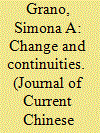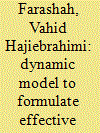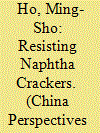| Srl | Item |
| 1 |
ID:
134309


|
|
|
|
|
| Summary/Abstract |
In representative governments, a healthy turnover of power among ruling parties is viewed as a critical sign of democratic principles. In a political environment where voters’ opinion is the key political driver, the greatest challenge facing the NGO community is often that environmental concerns only represent secondary aspects of the policy-making process. This article focuses on the transformations (or lack thereof) in Taiwan’s environmental governance, under different political parties, particularly during the past few years. I begin with an overview of the key issues that have characterised Taiwan’s environmental movement and its battles, starting with the democratic transition of the mid-1980s, before focusing on two developmental projects – Taiwan’s eighth petrochemical plant and fourth nuclear power facility – to bring to light the most significant changes and continuities in the environmental-policy realm. I pay special attention to the post-2008 period and the ensuing renaissance experienced by the environmental movement, among others. The final section considers the consequences of the KMT’s second elect-oral victory – in January 2012 – for environmental policies and, in light of the article’s findings, summarises what has changed and what has consistently remained the same under different ruling parties.
|
|
|
|
|
|
|
|
|
|
|
|
|
|
|
|
| 2 |
ID:
176118


|
|
|
|
|
| Summary/Abstract |
The petrochemical industry plays a pivotal role in achieving high value-added products from oil and gas reserves. With attention to oil and gas reserves in Iran, it is clear that the petrochemical industry has not grown up adequately. This study aims to determine effective factors on petrochemical industry development and model the mechanism of capacity expansion budget creation using a system dynamics approach. A quantified system dynamics model has been built based on causal relationships and the mechanism of development budget allocation among categorized products. This structure is used to simulate the model and investigate essential variables related to each product, such as production capacity value, production rate, domestic sale revenue, and export. According to the results of a simulation, in 2025, Iran will have a capacity of approximately 104 million tons of petrochemical products that is not desirable. In this study, a policy of improving budget plan and allocation is introduced as the most effective solution to achieve the petrochemical industry development. By implementing this policy the production capacity and total revenue would respectively be improved by 4% and 13% in 2025 in comparison with the base run.
|
|
|
|
|
|
|
|
|
|
|
|
|
|
|
|
| 3 |
ID:
031272


|
|
|
|
|
| Edition |
3rd ed.
|
| Publication |
New Delhi, Statistics Division, Petroleum Information Service, 1970.
|
| Description |
222p.Hbk
|
|
|
|
|
|
|
|
|
|
|
|
Copies: C:1/I:0,R:0,Q:0
Circulation
| Accession# | Call# | Current Location | Status | Policy | Location |
| 013022 | 661.8040954/NEW 013022 | Main | On Shelf | General | |
|
|
|
|
| 4 |
ID:
134413


|
|
|
|
|
| Summary/Abstract |
Protests against naphtha crackers have been an important trend in Taiwan’s environmentalism since their emergence in the mid-1980s. This article analyses ten protest cases (1987-2011) to understand the evolution of environmental politics. I draw the following conclusions: (1) with the growing public awareness of pollution, new petrochemical projects are increasingly facing popular opposition; (2) the environmental movement assumes less partisanship, although ideological differences between the political parties still remains; (3) the mobilising capacity of NGOs is on the rise and has become the key factor in the success of protests.
|
|
|
|
|
|
|
|
|
|
|
|
|
|
|
|